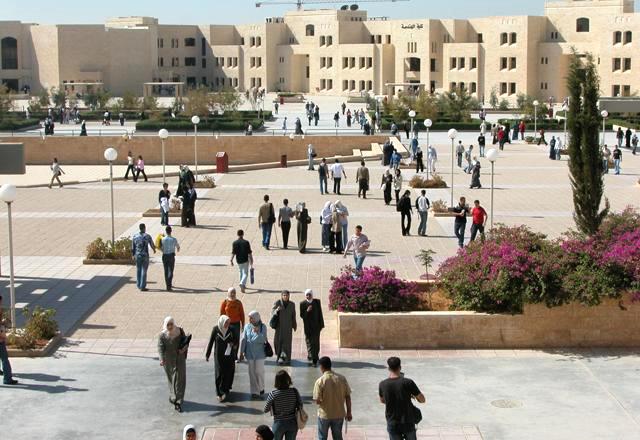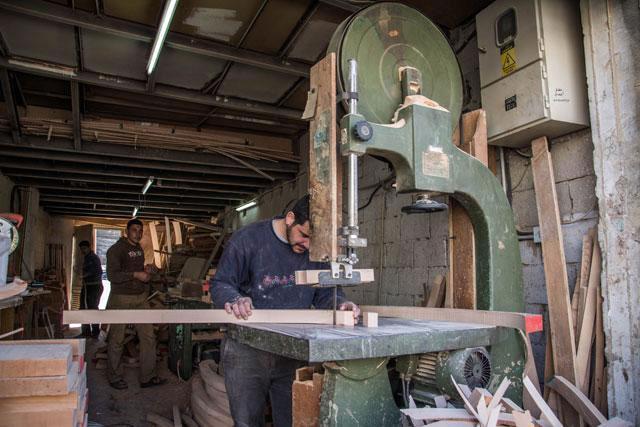You are here
Webinar reviews measures to tackle rising unemployment among youth
By Rana Husseini - Sep 26,2020 - Last updated at Sep 26,2020

Experts said that the government needs to adopt new methods to encourage more youth to join professions that are usually assumed by foreign labourers and promote vocational education to fight unemployment among the younger generation (File photo)
AMMAN — Experts said that the government needs to adopt new methods to encourage more youth to join professions that are usually assumed by foreign labourers and promote vocational education to fight unemployment among the younger generation.
The calls were made during a webinar, held last week, which saw the participation of experts from the Phenix Centre for Economics and Informatics Studies (PCEIS), as part of a series of discussions that are being conducted in cooperation with Friedrich-Ebert-Stiftung (FES) titled "The Effects of COVID-19 on the Youth in the Labour Market".
"We are conducting a series of discussion events to tackle the effects of COVID-19 on all segments of society and last week it was on youth and next week it will be child labour," Director of PCEIS Ahmad Awad told The Jordan Times.
Awad added that the youth “suffered the most” in finding jobs in the labour market even before the pandemic crisis.
"Before the COVID-19 crisis, unemployment rates among youth was between 42 per cent and 52 per cent. Today, the figures are between 47 and 58 and this is a double challenge for the youth and empowerment," Awad said.
He added that “the issue is not only about finding a job, but also the fact that people are being fired from their jobs, and this is a big problem”.
According to a recent survey conducted by the PCEIS between mid-March and mid-May 2020, 40 per cent of people in Jordan lost their businesses or jobs completely.
The survey revealed that 37 per cent of respondents partially lost their businesses or jobs, while the remaining 23 per cent were not impacted, according to the findings that were published on the centre's website.
The majority of those who were not impacted, work in the public sector, according to the findings.
The survey, conducted online during the third week of May, measured the responses of 2,120 individuals and aimed to assess the impact of the coronavirus crisis on the economic conditions of families in Jordan, according to the PCEIS's website.
Of respondents working in the private sector, 36 per cent indicated that their jobs have been suspended completely, while 57 per cent of business owners have completely shut down their establishments, the findings revealed.
Meanwhile, 29 per cent of female respondents said that their jobs were not impacted while 22 per cent of the male respondents indicated that their jobs were not affected, according to the PCEIS study.
The survey's sample included 76 per cent of males and 24 per cent females, according to PCEIS.
"Women were more affected by job suspensions, as 41 per cent said that their jobs were partially impacted, compared with 36 per cent of male respondents," according to the PCEIS study.
The PCEIS survey also revealed that 20.9 per cent of respondents received their salaries as usual during the period between mid-March and mid-May, while 19.7 per cent said that 30 per cent was deducted from their salaries, and 10.3 per cent of respondents had 50 per cent docked from their pay.
Economist Wajdi Makhamreh said that part of the unemployment factors among the youth was the COVID-19 pandemic as well as their preference to work in certain fields such as medicine and engineering, which has no employment opportunities for them.
The pandemic, according to Makhamreh, has already affected unemployment rates in Jordan, which "currently stands at 23 per cent but by the end of year, it will reach between 27 to 30 per cent".
"The government needs to direct and encourage students to study technical and vocational streams to fill in the gap in these professions and also need to work on eliminating the current cultural convictions among youth who are refusing to work in certain professions such as in agriculture fields because they feel it is below their standards," Makhamreh said.
For instance, the government can provide Jordanians with land lots to encourage them to work in the agriculture sector or increase their salaries in other professions, so that they would be encouraged to enroll in these professions instead of leaving it for foreign labourers, Makhamreh told The Jordan Times.
A July report by the Workers’ House predicted that the number of unemployed citizens will reach 629,000 by the end of this year.
The report, made available to The Jordan Times, noted that the predicted figure consists of 350,000 citizens who were unemployed before the coronavirus pandemic, 146,000 who are now likely to lose their jobs in the formal and informal sectors due to the pandemic, 100,000 who are new entrants to the labour market as job seekers and 33,000 are Jordanian expatriate workers who lost their jobs abroad.
The report noted that the World Bank estimated the remittances of Jordanians during 2019 to be $3.7 billion, a figure which declined during the first four months of 2020 by 6 per cent compared with last year.
The report also showed that the return of expatriates will contribute, along with other factors, in a very large increase in unemployment rates.
Before the pandemic, the unemployment rate stood at 19.3 per cent, numbering 350,000 citizens. The report feared that with the World Bank expecting the Kingdom’s economic growth to decline in 2020 by 5.8 per cent, the unemployment percentage will “significantly increase”.
The FES, which opened its offices in Jordan in 1986, engages in extensive activities across the entire MENA region. The activities of FES Amman aim at promoting democracy and political participation, supporting progress towards social justice and gender equality as well as at contributing to ecological sustainability and peace and security in the region, according to its website.
The Phenix Centre works to promote a sustainable developmental paradigm in Jordan, rooted in human rights and the principles of democratic governance by focusing on reforming the labour policies, lifting of restrictions on freedom of association, and strengthening of social protection policies, according to its website.
Related Articles
AMMAN — A recent Arab Barometer report shows that nearly 50 per cent of Jordanians wish to immigrate, 93 per cent of whom are motivated by e
AMMAN — Vocational and technical training institutions will help boost economic growth and reduce youth unemployment, according to experts.&
AMMAN — Between mid-March and mid-May 2020, 40 per cent of people in Jordan lost their businesses or jobs completely, according to a study c

















